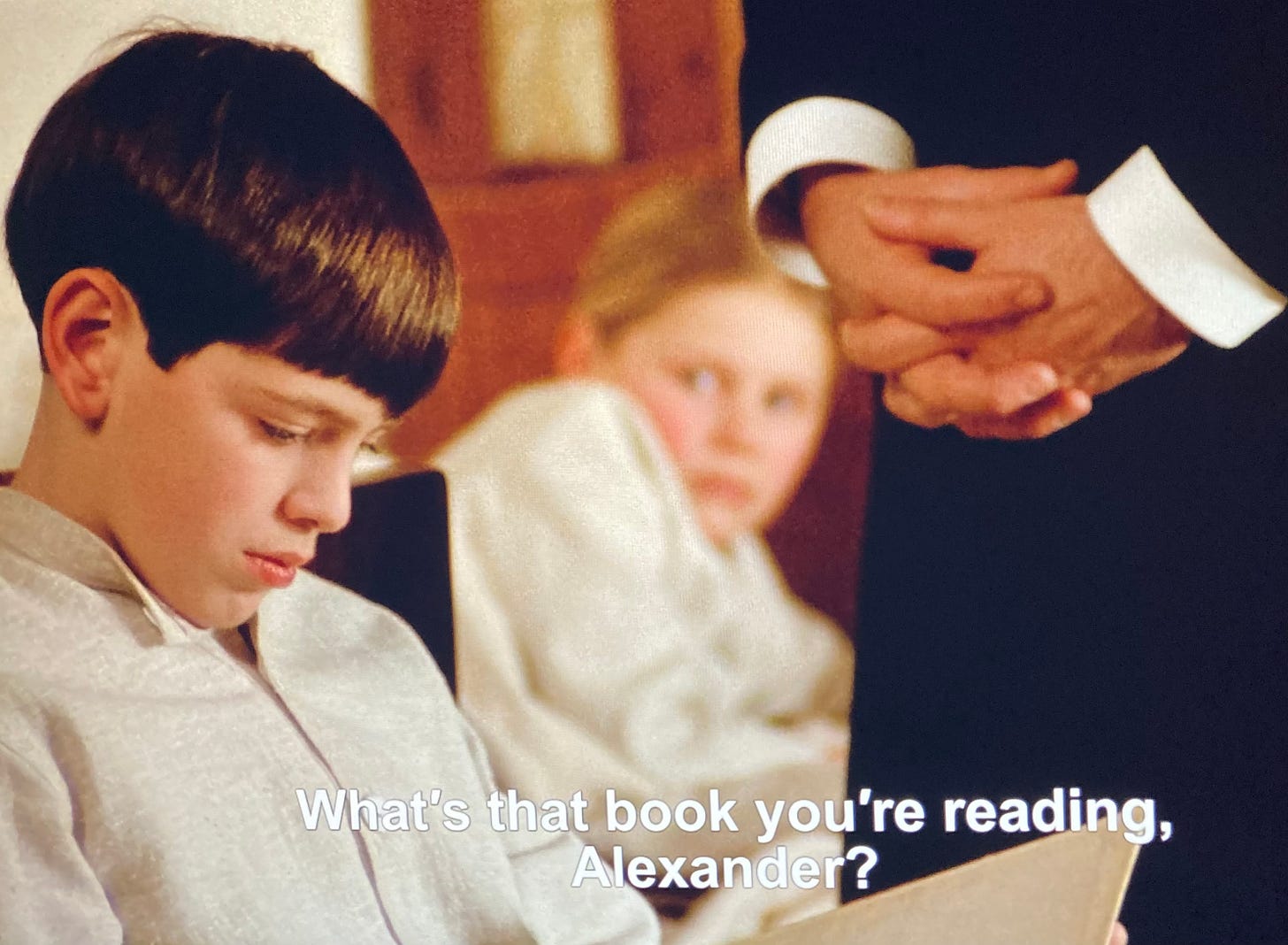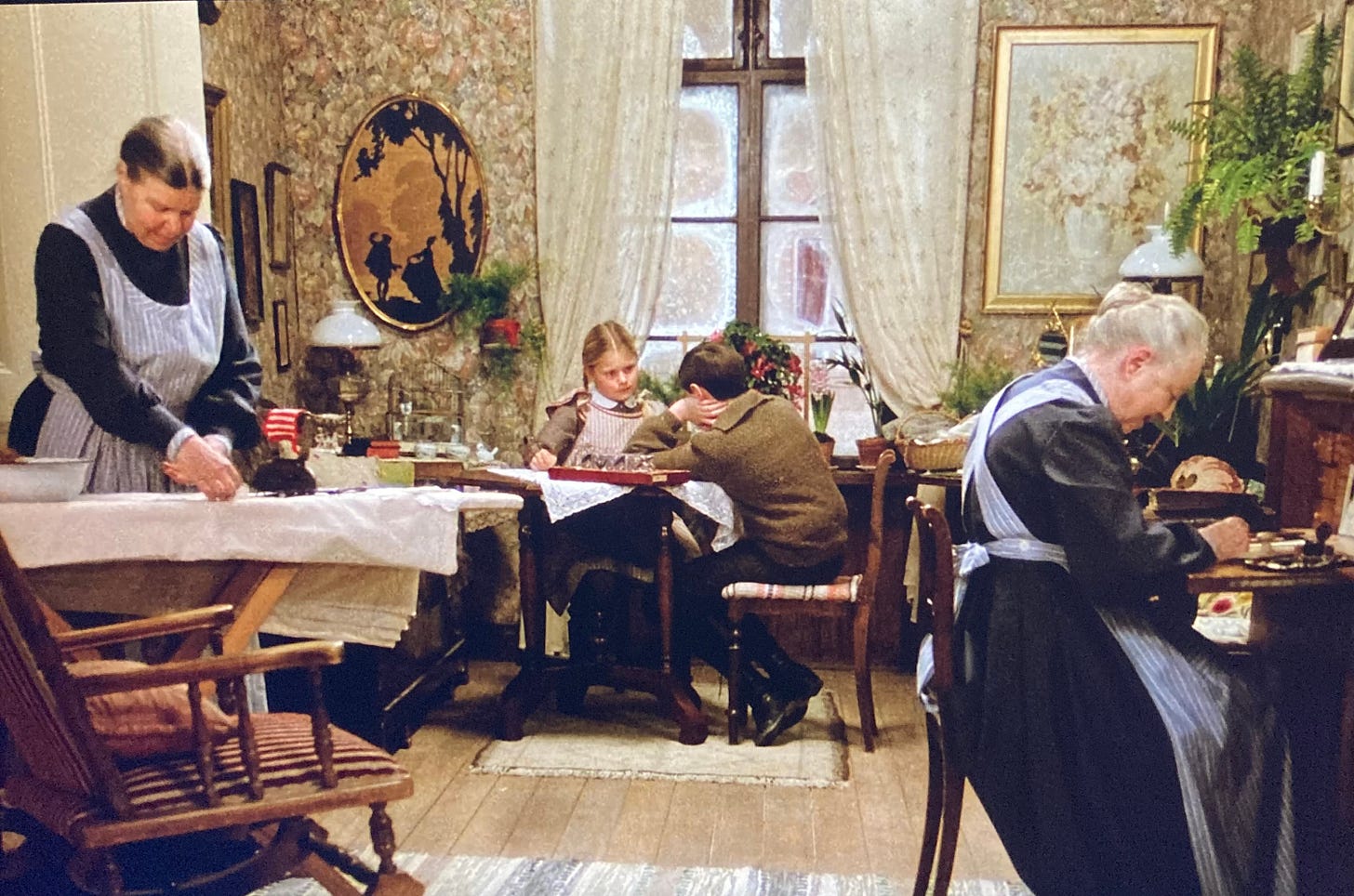Ingmar Bergman Winter Survival Series: Fanny and Alexander (1982)
Join StoryShed for a five-film watch party through the winter of 2024-25
Well, this was unexpected.
Sort of like what happens just after Christmas in director Ingmar Bergman’s masterpiece Fanny and Alexander.
What was that? Well, that would be telling. You’ll need to watch the film to know! I plan to rewatch it over the Thanksgiving holiday.
Much thanks to
and her enthusiasm for a Bergman Winter Survival Series and assisting with outreach and stunning Bergman film stills (Every Frame a Painting!)…Pushing Reset: Addendum December 8, 2024
First off, my apologies for what I’m calling poor communication protocol for this film series. Some ground rules, best practices (and my five-page notes dump on Fanny and Alexander) hopefully will add clarity.
Ground rules
The film schedule below will not change, so you’re free to watch them any time and in any order you wish. I decided to start with Fanny and Alexander because it’s a favorite “holiday” film (though the pleasure of that is the blink of an eye given the rest of the narrative—a lot like life IMHO).
Since participants (free subscribers and followers welcome!) are all over the globe, the “Chat Deadline” listed below is actually the cut-off before we get rolling on the next film to watch and discuss. I will leave a three-hour window for that on the date posted, and participants will always be free to post comments on the particular chat thread for that film, or back here on the StoryShed newsletter site, with the newsletter post pertaining to the film.
I’ll eventually put up a mini-essay to jump start discussion, but in all honesty, I’m more interested and curious about your takes than my own. I never know what I think about things until I’ve written them down and changed my mind a couple dozen times. That’s just how I roll.
Here’s the schedule for the rest of the films in the series:
Fanny and Alexander (New Chat deadline: December 31, 2024, 10am - 1pm CST)
Winter Light (TBD, mid-January 2025)
The Virgin Spring (TBD, early February 2025)
Wild Strawberries (TBD, late February 2025)
The Seventh Seal (TBD, March 2025)
Outside of that, feel free to comment below and after year’s end, I’ll move on to Winter Light.
Best practices
I’m open to modifying for the greater enjoyment of everyone involved (if people want to do a Zoom chat, we can arrange it) but dropping comments and visiting the Substack Chat seem like the best way to go here, and not punitive to everyone’s time and attention.
If you enjoy movies and great storytelling, Bergman will not let you down.
Not For Pleasure Alone (on Fanny and Alexander)
The magic begins Christmastime 1907 into the new year of 1908.
It’s Sweden, and we’re introduced to the Ekdahl family, brothers Gustav-Adolph (Gusten), Oscar, and Carl, with their wives Alma, Emilie, and Lydia. Fanny and Alexander are Oscar and Emilie’s two children, while Carl and Lydia are childless.
Most of my notes are just random thoughts…
The dreams of children, “It’s Yule Again!” Spirit lamps and Alexander tries to tell his own story.
“Here comes my family!” sighs Helena.
Grandmother Helena is central to the film and her former lover “Uncle” Isak, the Jewish moneylender in town, is Helena’s confidante.
“This year,” Helena tells Isak, “all I wanted to do is cry.” He’s sympathetic.
“The happy splendid life is over,” she sighs, “and the horrible dirty life engulfs us!” (Remember, she’s a retired actress. This is what she knows and capably shows us: histrionics!)
Sexual politics: Carl and Lydia—his drinking and overthinking, disgust at his status in the family and relationship, such as it is, with Lydia. Failure. Gusten and Alma—he’s sexually insatiable and always fucking a new maid. The latest is Maj, who Alexander is also in love with. Gusten’s wife Alma is on to it and in some ways has just learned to deal with it, or back-channel through Emilie and Helena. The women stick together and Bergman masterfully shows us this throughout the film. Time and time it’s proven: the women are brave and long-suffering. The men are cowards.
Christmas is happy, but after the Christmas play, the theater that Oscar runs opens with Hamlet. Oscar will play the Ghost of Hamlet’s father. It doesn’t bode well for the new year and during rehearsal, he collapses.
The drawn-out pain of a dying parent. The terror of holding his dying father’s hand.
Emilie’s shrieking into the night after Oscar has died.
When we die. Waves of agony: “Shit, Piss,” grumbles Alexander in the funeral procession, Fanny smiling and holding his hand, “Fart, Cock, Cunt, Damn…Hell…”
Then, almost out of no where—Emilie falls in love with the Bishop. She’s under his sway. THE FUCKING BISHOP. What an asshole. “But diligence and good grades are not everything in this world.” Fucking tell me about it.
What is a lie and what is the truth?
“One lies,” says Alexander, “to gain an advantage.” Bravo.
Question: How do we know Alexander is a warrior for the truth? Is he a liar? Or a truth-teller? Who is his sister Fanny? Who is Alexander? Why are they important to this particular story?
Maybe Helena lets us in on that when she says, “One is a child and old at the same time…”
The children imprisoned by the Bishop and his cruel family. No more family. No more love and affection. Harshness and cold, hunger and pain, even Emilie struggles with the loss of the world she once knew.
The religious iconography of Bergman: Emilie as Mary Magdelene, Alexander as Christ…
Once you see it, you can’t unsee it. Above Alexander’s head.
Christ has been relegated to the attic, where no one will have to think about what Christianity really involves, an old relic, forgotten, hated, despised and loathed.
What will be the family’s salvation?
It will involve magic, and maybe the Kabbalah? Jewish mysticism and the wonder of God hidden among handmade puppets? What is the meaning of the flash of light above Isak Jacobi’s head when the Bishop runs to recover the children…are they in the trunk or are they in the bedroom? How was this magic achieved?
However accomplished, Fanny and Alexander are delivered to Isak’s shop, with cousin Aron taking care of Ismael and Alexander having a late-night talk with the ghost of his father Oscar…
What is Fanny and Alexander about? It’s about Bergman’s generation, which in my own family would’ve been my paternal grandfather, born in October 1900, so the generation that began the 20th century. Was that generation “gentle with other people”? What do you think?
When I first saw the film in the theater in 1982 (or early 1983, I can’t recall) I was on my own because I had very few independent film friends in those days. I was in my 20s and I was becoming cynical, so I identified with Alexander. The people above us were liars, and we knew it.
“I have only one mask,” the Bishop says to Emilie, echoing Uncle Carl’s admission to his wife Lydia, and later Helena’s admission of all the masks she’d worn in her life…mostly happily being a mother.
Aron and Ishmael know Alexander’s future is to be an artist, but first he must destroy the cynicism and hatred of the current world, in order to move forward. “Uncle Isak,” Aron tells Alexander, “says we’re surrounded by different realities, one on top of the other,” echoing the Kabbalah. Ishmael says to him, “You’re a strange little person, Alexander. You won’t speak of that which is constantly in your thoughts.”
What does the soon-to-be crucified prophet think about? Will he be a wild man? A devil? Protector and angel? Will he lie and steal? Take pleasure in the world?
Alexander and Fanny will have to fight for their places in a dark new world. They were given the tools to change it, but will they? Can they?
It’s fitting the story ends with Helena, at Emilie’s urging, returning to the theater to perform again in Strindberg’s A Dream Play.
Alexander returns to his grandmother’s arms to dream along with her.
“Time and space don’t exist.”
Feel free to reach out with questions in the comments and see you over the winter months!















As Michael knows, I am working toward a series on Ibsen and Bergman on my site, so I've put off Bergman SOMEWHAT. I saw Episode 1 one week ago, and I watched episode two this evening in Hanoi.
I hope that this is helpful for people as a little preview of how I might relate Ibsen (the playwright and Bergman - the auteur film director). The difficulty here is that I'm afraid I've set myself an impossible task; this is a kind of brainstorming I've written and pasted here though, halfway now.
Episode(s) 1-2 (My Notes):
The introduction to the Ekdahl family dynamics in this episode really reminded me of Ibsen's exploration of familial obligations like those in "Ghosts". There is a clear tension between maintaining family honor and dealing with personal secrets that feels just as palpable in both Bergman and Ibsen's plays.
- Alexander's wild imaginative escapades - "The Wild Duck": of all Ibsens plays: there's magical realism in both . . . I need to see more scholarship about where this comes from in Scandinavian history/culture, and into the present. Illusion and reality blend, hinting at the deeper questions we might face about how much truth we can handle.
-Bergman, in these early episodes, is most pressing into the conflict between personal desires and societal norms, for me.
The theatrical elements are obvious. (Metatheatrical, I should say). I've now seen Fanny and Alexander 2.5 times and this third round is the first with the full television series. My gosh, the artistry, character and world building . . . It's almost impossible to incapsulate what is ALL that is unfolding here. "Hedda Gabler" is my favourite of Ibsen's plays . . . oddly, I don't see it figuring much in my analysis of the film. But there will be time for that soon.
Are these notes even legible? I hope the names of the plays pop out at least. If you're a Bergman fan, Ibsen is an ESSENTIAL resource!! Same for Michael Haneke . . . I want Haneke to adapt a film version of "Hedda Gabler."
Which version are you watching? 3 hour light-dusting or 5 hour heavy snow?